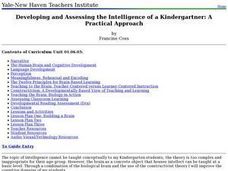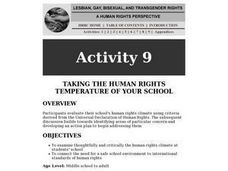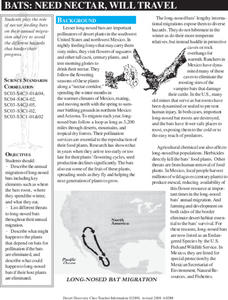Curated OER
Developing and Assessing the Intelligence of a Kindergartner: A Practical Approach
Young scholars name objects that are the same size, shape, and weight as the human brain. They touch the model brain, feeling the folds, etc. They make connections to the chart displaying the brain-like objects. They touch the 'potato...
Curated OER
Animal Life Cycles
Students participate in numerous activities to gather information about parts of the life cycle. In this life science lesson, the teacher choose from a number of activities to create or support an interdisciplinary unit about the life...
Missouri Department of Elementary
Healthy Touches and Private Touches
Scholars identify the difference between healthy touches and private touches. A discussion leads pupils to recognize several trusting adults. Peers role-play scenarios in which they use three rules to remain safe.
Curated OER
Who Knows? Your Privacy in the Information Age
Teach young adults how to become advocates for their privacy in the modern information age. In a series of five lessons, learners explore their beliefs and opinions about privacy vs. the actual laws regarding who has the right to access...
Hastings Prince Edward Public Health
My Life—My Reproductive Health
Keep learners informed about their options and rights when it comes to their sexuality. An in-depth lesson plan guides teenagers through a discussion on sexually transmitted diseases, teen pregnancy, and emotional consequences to having...
Curated OER
Taking the Human Rights Temperatutre of Your School
Students evaluate their school's human rights climate using criteria derived from the Universal Declaration of Human Rights. They discuss the results and develop a plan of action to begin addressing the problems they find.
Baylor College
Food for Kids
Immediately capture the attention of your class with the smell of freshly popped popcorn in the sixth lesson of this series on the needs of living things. Young scientists first use their senses to make and record observations of...
Curated OER
Summer Body Activity: A Nose Workout
Young scholars have sensory experiences with the sweet smell of discovery. In this early childhood science lesson, students use their sense of smell as they create and compare their very own fragrance essences with a variety of provided...
Baylor College
Plant Parts You Eat
Plants provide a variety of delicious foods essential for human survival. In the fourth lesson of this series on food science, young scientists investigate common fruits, vegetables, and grains in order to determine which plant part is...
King Country
Lesson 2: Private & Public
What is the difference between a private and a public place? The focus in this second lesson on family life and sexual health is building an understanding of the difference between the concepts of private and public and the behaviors...
Curated OER
Are Adult Pancreatic Beta Cells Formed by Self-duplication or Stem Cell Differentiation?
A case-study of Dr. Melton's experiment on pancreatic cells highlights this worksheet. Details of the study adorn the first three pages, complete with diagrams. Biology buffs then analyze the data and identify problems within the...
Baylor College
Needs of Living Things: Post-Assessment
Assess your class's knowledge of the needs of living things with the final lesson in a series. Given a large piece of paper and coloring utensils, young scientists draw a picture of themselves and a plant or animal of their choosing,...
Curated OER
The Convention on the Rights of the Child
Students chronicle development of human rights for students up to the Convention on the Rights of the Child, define human rights for students according to Convention, and identify and discuss three components of the Convention:...
Curated OER
Lesson Plan on Homeless Children
Students research reasons as to why children end up living on the streets. This instructional activity examines reasons as to what happens to parents and adult caregivers so that they are no longer able to provide basic needs for these...
Curated OER
Brain Awareness Week
Students explore human anatomy by completing a list of activities over five days. In this brain science lessons, students examine images of brains and identify the different parts. Students complete an in-class quiz regarding brain...
Curated OER
Philanthropic Literature: Quilt to Freedom
A reading of Sweet Clara and the Freedom Quilt by Deborah Hopkinson launches this study of slavery, freedom, and the Underground Railroad. After a discussion of the importance of showing respect for others and of helping each other in...
Curated OER
The Right Ideas
Students investigate the Bill of Rights and explain how non-profit organizations take care of those rights. In this Bill of Rights lesson, students work in groups to look at the rights that are included in the Bill of Rights. They...
Curated OER
The Elderly Poor: Human Rights
Students examine facts about the elderly population of the United States that lives in poverty through the context of universal human rights. They participate in class discussion, review census records, read case studies, interview...
Chicago Botanic Garden
Personal Choices and the Planet
How big is your footprint? Activity three culminates the series by having groups complete carbon footprint audits with people in their schools and/or around the districts. Groups then gather their data, create a presentation including...
Curated OER
What's Inside
Students become more familiar with life science in the context of the scientific method which helps them to become familiar with the various kinds of life science diagrams they may see on a GED science test.
Curated OER
Brain Awareness Week Lessons
Learners explore the human brain and nervous system. For this brain awareness lesson, students examine specific terms with regards to the human brain. Learners discover the brain's structure and function and how it functions as the...
Howard Hughes Medical Institute
The Making of the Fittest: Got Lactase? The Co-evolution of Genes and Culture
Got milk? Only two cultures have had it long enough to develop the tolerance of lactose as an adult. Learn how the responsible genes evolved along with the cultures that have been consuming milk. This rich film is supplied with a few...
Curated OER
Bats: Need Nectar, Will Travel
Beginning wildlife biologists become adult bats, baby bats, snakes, owls, bobcats, or land-clearing developers in a grand role-playing activity. In a large open space, they play a game in which they move to designated areas based on what...
Baylor College
Neurotransmitters Contain Chemicals
Human body systems students play a card game, "Locks & Keys" in order to learn that neurotransmitters carry a message from one neuron to another by fitting into a receptor site on the receiving nerve cell. While this activity can...

























